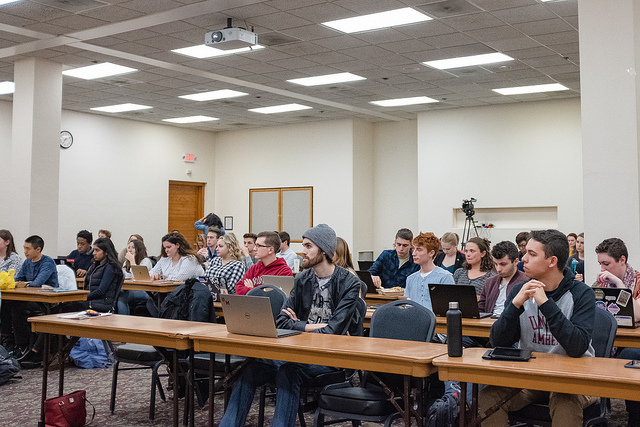Monday night, the Student Government Association of the University of Massachusetts voted to confirm three new senators for the classes of 2019, 2020 and 2021, and passed a motion in support of the Residential Assistant and Peer Mentor Union.
For the class of 2019, senior operations and information management major Timothy Conceison responded to a series of questions prior to his confirmation. Conceison, who served as a senator for the previous three years and ran for SGA president last year, chose not to run in the fall semester for a fourth year.
“I spent hours and hours in this organization, and I wanted time to take a step back,” Conceison said.
With a position open for the spring semester, Conceison applied to return, seeking appointment to the Ways and Means committee, where he previously served for two years.
Multiple senators asked about Conceison’s activity on social media, referencing an occasion in which Conceison allegedly used a laughing emoji in response to a post regarding student food insecurity. Conceison asserted that he is interested in learning more about student food insecurity and recognizes the severity of the issue.
When asked about his personal relationship with the chair of the Ways and Means committee, Senator Alexandra McCandless, Conceison said that he didn’t think it was going to be an issue, adding that he “couldn’t be more confident that it will be just fine.”
In the class of 2020, Kate Pecora expressed her interest in becoming a senator after seeing the SGA work with Student Activities and Involvement. Pecora, a BDIC and political science double major, was sworn in.
Nate Bennett, a sophomore sports journalism major, applied for the class of 2021 seat after transferring to UMass from Gettysburg College in Pennsylvania.
Bennett said that he “was a senator down at Gettysburg” and that he was “hoping to, as a transfer student, bring a different perspective.” He added that it was his 13th day on campus.
Conceison, Pecora and Bennett were all sworn in following Senate confirmation.
Associate Speaker Rachel Ellis spoke about filling future positions in the Senate. Noting several resignations that have happened in the 2018-19 academic year and the low roll call for the meeting, Ellis said that the SGA has “45 senators of the 60 we should have.”
“Remind yourself why you’re here as a senator,” Ellis said, inviting any senators to come and speak to her if they were unsure about their future as a senator.
President Timmy Sullivan announced “with a heavy heart” that applications are now being accepted for the positions of secretary of technology and SGA vice president. Former secretary Samuel Poza resigned at the end of last semester and former vice president Nathalie Amazan’s resignation became official on Feb. 4. Applications will be open for two weeks.
Regarding upcoming elections, Sullivan nominated five election commissioners, who were ultimately confirmed and sworn in later in the meeting.
Sullivan emphasized that the election would ultimately be a “contest of ideas,” with the intention of creating policy to serve all of the students on campus. Sullivan has not announced whether he will run for re-election, but he did offer to speak to any students who are planning to run for his position.
Additional passed motions in the meeting worked on clarifying policy language regarding Registered Student Organizations, renaming “Back to the People” meetings as “Community Outreach Events” and demands for the University to begin a fair and transparent bargaining process with the RA/PM Union.
Naria Sealy, a co-chair of the RA/PM Union, emphasized the importance of the bargaining process regarding racial sensitivity training.
“We really wanted our residents to feel comfortable…we really wanted to make sure everyone was equipped to deal with any situations that arose on campus,” she said.
“The University doesn’t always have protocol in responding to things that are sensitive,” Sealy added, referencing multiple racist incidents which occurred in the fall semester.
Addressing a question from a senator about whether an increase in investment and training would be cost-effective, Sealy said that compensation in housing wasn’t enough, as many students who work for Residential Life use their rooms as their workspaces.
Sealy added that RAs are constantly available, noting that if a student knocks on their door at 3 a.m., the RA responds.
Senator James Cordero, a sponsor of the motion, proposed amendments to alter language to propose racial sensitivity training for “RAs and PMs” rather than the original language of all Residential Life Staff. Cordero added that while he wished the SGA could vote to impose training for all staff, the motion could only address members of the RA/PM Union.
Cordero, Sullivan and Senator Hayden Latimer-Ireland sponsored a motion to place a vote on the student ballot regarding SD.101 and SD.1178, two legislative measures, colloquially known as the “Fund Our Future” bills, which would increase funding for public education at the K-12 and college levels in Massachusetts. If passed, the measures would result in a freeze and, when possible, a reduction in tuition and fees at public colleges and universities across the state.
On the ballot, a “yes” vote would urge the UMass Board of Trustees to endorse the two resolutions. A “no” vote would not urge the Board of Trustees.
After debate concerning the student activities fee, the motion overwhelmingly passed the senate.
Kathrine Esten can be reached at [email protected] and followed on Twitter at @KathrineEsten.




















Tyler Durden • Feb 5, 2019 at 11:49 am
Funny how the Collegian leaves out a disgraceful letter endorsed by the Sullivan Administration likening Trump to those who have committed mass genocide and ethnic cleansing. I’m glad the SGA is really focusing on what matters… What a bunch of tabloid garbage. A fool thinks himself to be wise, but a wise man knows himself to be a fool.